I am very excited to bring you a Q&A with the wonderful William Ryan today. I recently reviewed The Constant Soldier by William (you can read it HERE) and was lucky enough to see him on the Behind Bars: Freedom, Oppression and Control panel at Hull Noir. The Constant Soldier is one of those books that made a huge impression on me and I was delighted when William agreed to answer a few questions.
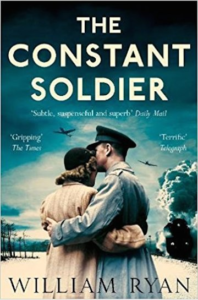
What was the initial inspiration behind The Constant Soldier?
In 2007 a photograph album put together by a man called Karl-Friedrich Hoecker was donated to the United States Holocaust Memorial Museum. From June 1944 until January 1945 Hoecker was the Adjutant to the Commandant of Auschwitz and the photographs were taken during his time there – mainly at a nearby rest hut for the SS officers and other ranks who ran Auschwitz. You can see some of the photographs in the album here: https://www.theguardian.com/books/gallery/2016/nov/22/nazis-retreat-ss-holiday-hut-auschwitz-pictures-mengele-photographs and the striking thing about them, for me at least, is how ordinary the people who feature in them look, even though they include mass murderers and sadists like Rudolf Hoess and Josef Mengele. I’ve always been amazed that the Holocaust was ever even possible – how ordinary people came to be involved in the extermination of millions on millions of other ordinary people. I think the photographs gave me an insight into how the perpetrators – some of whom had started out life on very different courses – had changed from being apprentice confectioners, bank clerks and bookkeepers to being responsible for the horrors of the Holocaust. And how they dealt with that. So that’s how the novel started out – although it perhaps evolved into a wider consideration of personal responsibility and the perils of totalitarianism.
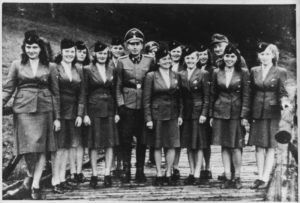
The Constant Soldier is a powerful tale about one of the most horrific moments in history. At its heart is the human condition and the impact that events such as the Holocaust have on those who are involved be it willingly or forced. Was this aspect your original intention or did it evolve as you wrote?
I think it was always something I knew I’d have to address and it’s probably why I ended up telling the story through the eyes of three main characters – Neumann, an SS officer; Brandt, a wounded soldier who has returned from the front and Agneta a prisoner. All three of them have very different perceptions of the reality in which they live – and very different expectations of what will happen to them now that the War is nearly over. Brandt is the main character and his need to atone for his responsibility, peripheral as it is, for the Holocaust and, indeed, Agneta’s imprisonment is what drives him – and the novel. His efforts to rescue Agneta and the other women prisoners who work in the hut out of it, is what the story is all about. But it’s also Agneta’s story – how she copes with the terror of her situation and how she manages to survive. And Neumann’s as well – who now has to face up to the consequences of his actions and the reality of his guilt.
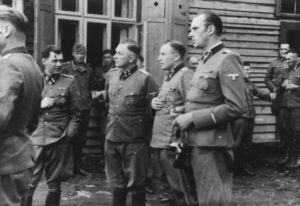
Although a work of fiction, The Constant Soldier is based on actual events. How long did the research take you to ensure it came across as authentic?
I did a lot of research but I was very careful to fictionalise everything at the same time. The camp they work at, but which the novel never visits, is not identified and nor are the local town and village. Likewise all of the characters were my inventions. That meant I could create a fictional world that was authentic but, at the same time, allowed me to look at some of the ideas I wanted to explore. So while a lot of the scenes in the novel are based on particular photographs – I’ve no idea what actually went on in those photographs or much about the people in them and the novel’s scenes are completely imagined. The novel creates a parallel world that could have existed, perhaps – and so the research went into make it believable and accurate to the time. Most importantly, with the holocaust being sacred history, I had to be respectful to that history – but at the same time hopefully add something to a modern reader’s view of it.
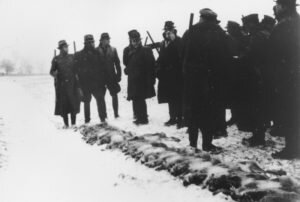
Why write historical fiction? What other genre would you like to have a go at?
Normally I write historical crime and I have a contemporary crime novel I’m working on at the moment. I also have a ghost story, which is kind of fun – and some science fiction. So I’m pretty flexible. What I like about historical fiction though, is that it allows you to explore contemporary issues in a slightly disguised way. And if, from that, you might wonder if I think there are parallels between the 1930s and today, I’d probably have to agree that there might be one or two …
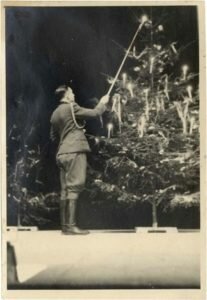
You are took part in this year’s Hull Noir. Is talking about your work at events something you enjoy or do you get nervous?
I do a lot of events and talk so I really don’t get nervous any more – and I also enjoy it. Writing is often a lonely old game – so any opportunity to get out and meet readers is a welcome one.
A huge thank you William for taking the time to indulge me and answer my questions. I know you have been busy, so it is much appreciated. Great responses, I’m sure readers will agree.
If you haven’t yet read The Constant Soldier I suggest you get it on your TBR pile as soon as possible and check out William’s other books too.